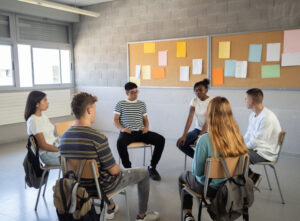Socratic Seminar
Overview
A Socratic seminar is a structured discussion used to promote critical thinking, active listening, and deep understanding of a topic or text. The purpose of a Socratic seminar is to encourage participants to think critically, analyze ideas, and explore complex concepts through thoughtful, open-ended questioning and collaborative conversation. Socratic seminars usually revolve around a text, but can also focus on a piece of art, a song, video, or data visualization.
The teacher facilitates the discussion by posing an opening question and using redirecting questions if or when the group strays from the central topic. Students take turns responding to the initial question, build off each other’s statements, and challenge the ideas of their peers. This strategy will be most effective for students in grades 6-12.
When planning a Socratic seminar, decide on the following:
- What text will be used?
As mentioned above, students typically discuss a piece of text- sometimes a news article, a short story, or a novel excerpt. However, you can easily facilitate a discussion around a graph (for math, science, and social studies classes) or a painting (for social studies, language arts, and foreign language classes).
- What will be the opening question?
The opening question sets the tone and solidifies the central idea for the seminar. Sometimes it is appropriate for the question to be answered round-robin style before opening for general discussion. Here are some general ideas to get you started:
ELA
What was the author’s purpose for writing this text?
What do you think is the most important part of this text?
Science
What do you think is the most important part of this diagram?
Why do you think this is important for us to study?
Math
What number or data point drew your attention when first looking at this graph?
What is the most significant definition in this text?
Social Studies
How does this video relate to current events?
What sentence in this text teaches the most about this event?
- How will each student participate?
Some educators choose to run seminars in a “fishbowl” style, where half of the class sits in a circle discussing the media at hand, while the other half sits on the outside of the circle as observers, taking notes on the discussion. The National Paideia Center recommends that seminars be run as a whole-class activity, everyone participating in the discussion at the same time.
